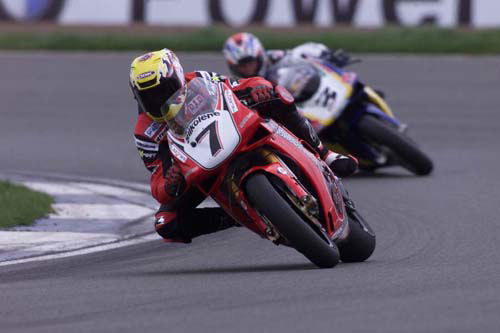BSB: 2002 regulations announced.
The British Superbike Championship is to become even more affordable and more competitive for the 2002 season.
The introduction of new technical regulations is intended to both reduce costs for competitors and to introduce more riders and teams into the country's premier motorcycle racing championship.

The British Superbike Championship is to become even more affordable and more competitive for the 2002 season.
The introduction of new technical regulations is intended to both reduce costs for competitors and to introduce more riders and teams into the country's premier motorcycle racing championship.
The new regulations will open the championship up to a wider array of machines, adding further quality to the power-thrillers currently enjoyed by millions of enthusiasts both at the various race circuits and through regular LIVE/as LIVE broadcasts on British Eurosport and deferred highlights transmissions on BBC TV Grandstand.
Following extensive consultation between BMP, MCRCB and the Motorcycle Industry Association (MCI) the championship will open its doors to 1000cc machines from 2002.
Such machines will adhere to a combination of the FIM Superbike and Supersport regulations. The basis of this ruling is that the appearance from the front, rear, and profile of Superbike machines must conform to the homologated shape, but the tuning of engines will be limited to that of the Supersport regulations.
In essence this means that machines' frames, suspensions, wheels, airbox and instrumentation will remain as they are under the current regulations, but engine tuning will be very limited.
The eligible machines for the 2002 British Superbike Championship will be those that are homologated by the FIM for their Stocksport/Superproduction categories, as well as existing machines from this year's championship running to the current FIM Superbike regulations.
The new regulations will be applicable for a minimum two years, with a review in 2003.
Robert Fearnall, the Chairman of British Motorsport Promoters, the promoters of the British Superbike Championship, believes that the changes will secure the long term future of the series: ''The new Superbike regulations represent a first in British motorcycle racing because they have been evolved from six months of consultation with motorcycle manufacturers, teams and suppliers".
''The input of a such a wealth of experience and knowledge has created a concept which, by balancing high performance with realistic costs, will guarantee the participation of every major UK motorcycle race team in the British Superbike Championship for 2002 and 2003.''
Jos Foulston, the British Superbike Championship Series Director echoed this belief: "This announcement demonstrates our commitment to ensuring that the British Superbike Championship will continue to attract the best teams and riders, who will all bid for glory in the UK's premier motorcycle series. With operating costs having continually increased at this level, the new regulations will allow not only for extended Top Team participation, but also a more level playing field between the Works and Privateer teams. Overall I expect the new regulations to deliver yet more excitement and closer racing for both our track-side and television audiences."
Nick Barnes, the Chairman of the MCI Road Race Group added: "The general feeling across the industry is that this is the way forward. Pure Superbike racing is becoming very expensive, but these new regulations reduce the costings and for the manufacturers gives them various options for participation with either existing machinery or new 1000cc production-based models. In this way, the racing wil be closer and more exciting with machines more allied to road bikes. Importantly these changes will ensure the continuing staus of the series as the 'number one' domestic championship in the world".
Dennis Carter, the Chairman of the MCRCB then concluded: "The new regulations will be good for everyone. For teams and riders they provide a way of controlling cost, while still giving close, exciting racing, and that in turn gives the race goers the product that they want, with good value for money.".

